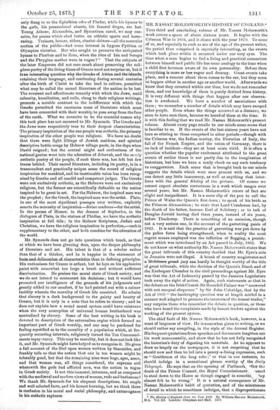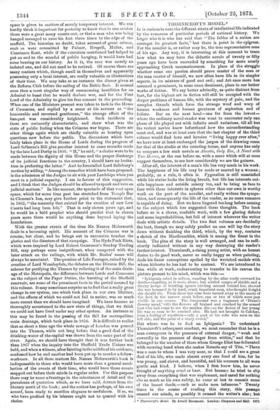MR. NASSAU MO LES W 0 MIPS LIISTORY OF ENGL
AN D.* Tuts third and concluding volume of Mr. Nassau Molesworth's work covers a space of about sixteen years. It begins with the Crimean War in 1854, and it closes with the year 1870. To some of us, and especially to such as are of the age of the present writer, the period thus comprised is especially interesting, as the events which took place within it occurred under our very eyes. The time when a man begins to feel a living and practical connection between himself and public life has some analogy to the time when a child first becomes aware of its own personality. Before then everything is more or less vague and dreamy. Great events take place, and a rumour about them comes to the ear, but they seem to happen either in another age or another world. Afterwards we know that they occurred within our time, but we do not remember them, and our knowledge of them is purely derived from history.
It is very different with things that happen after our observa- tion is awakened. We have a number of associations with them ; we remember a number of details which may have escaped other people. Even where the things occurred at a distance, we seem to have seen them, because we heard of them at the time. It is with this feeling that we read Mr. Nassau Molesworth's present volume. Almost every page recalls to our minds some scene that is familiar to us. If the events of the last sixteen years have not been so stirring as those comprised in other periods—though with the Crimean war, the Indian mutiny, the liberation of Italy, the fall of the French Empire, and the union of Germany, there is no lack of incident—they are at least more vivid. It is often a question whether the popular excitement attributed to the great events of earlier times is not partly due to the imagination of historians, but here we have a ready check on any such tendency to exaggeration. Each scene that is brought back to our minds suggests the details which were once present with us, and we can detect any little inaccuracy, as well as anything that inter- feres with the general fidelity of the picture. Of course we cannot expect absolute correctness in a work which ranges over several years, but Mr. Nassau Molesworth's errors of fact are slight and insignificant. It is a mere slip of the pen to call the Prince of Wales the Queen's first-born ; to speak of his bride as the Princess Alexandrine ; to state that Lord Cranborne had, by the death of his father, become Earl of Salisbury ; or to talk of Douglas Jerrold having died three years, instead of six years, before Thackeray. There is something of an omission, though not a very serious one, in the account of the garrotting panic of 1863. It is said that the practice of garrotting was put down by the police force being strengthened, when in reality the most cogent means employed was the infliction of flogging, a punish- ment which was introduced by an Act passed in July, 1863. We do not know on what authority Mr. Nassau Moles worth states that the great tribunals of this country decided that Mr. Eyre's acts
in Jamaica were not illegal. A bench of country magistrates and a Middleeen-gvaed• Pay ean_hardly be thought worthy of the title
of great tribunals, while the decision of the Queen's Bench and of the Exchequer Chamber in the civil proceedings against Mr. Eyre was that the Act of Indemnity passed by the Jamaica Legislature took away the right of action. Again, such statements as that in the debate on the Irish Church Sir Roundell Palmer was " answered with not unequal eloquence " by Sir John Coleridge, that by the
Act of 1869 " the bankruptcy question- was at length settled in a manner well adapted to promote the interests of the honest trader," may surprise those who remember the debate in question, or those who have heard the complaints made by honest traders against the working of the present system.
The chief fault of Mr. Nassau Molesworth's book, however, is a want of largeness of view. He is somewhat given to writing, or we
should rather say compiling, in the style of the Annual Register. His frequent quotations from speeches and documents lengthen out his work unnecessarily, and show that he has not fully recognised the historian's duty of digesting his materials. As he appears to draw so largely on the newspapers, it is not surprising that he should now and then be led into a penny-a-lining expression, such as " Gentlemen of the long robe ;" or that in one instance, he
should indulge in a sensational phrase worthy the Daily Telegraph. He says that on the opening of Parliatne '*fter the
death of the Prince Consort, the Royal Commissione 'erred to steal down to the House as though engaged in someth hey
almost felt to be wrong." It is a natural consequence ( Mr. Nassau Molesworth's habit of quotation, and of the minuteness of detail in which he sometimes indulges, that a disproportionate • The History of England from The Year 1830. By William Nassau MoIeaworth, M.A. VoL IIL London: Chapman and HalL 1873. space is given to matters of merely temporary interest. We can hardly think it important for posterity to know that in one session there were a great many counts-out, or that a man who was being hanged managed to raise his feet three times to the edge of the scaffold. The historian no doubt; takes account of great crimes, such as were committed by Palmer, Roupell, Muller, and Constance Kent, while if the execution mentioned had helped to put an end to the scandal of public hanging, it would have had some bearing on our history. As it is, the case was merely an isolated one, and did not need to be revived. Of course there are many matters which, though small in themselves and apparently possessing only a local interest, are really valuable as illustrations of their time. We may take as an instance the dinner given at the Reform Club before the sailing of the Baltic fleet. It seemed even then a most singular way of commencing hostilities for an Admiral to boast that he would declare war, and for the First Lord of the Admiralty to give his free consent to the proceeding. When one of the Ministers present was taken to task in the House of Commons, and replied by a sneer at his accuser as " the honourable and reverend gentleman," the strange effect of the banquet was considerably heightened. Such incidents as these are eminently characteristic, and show what was the state of public feeling when the Crimean war began. There are other things again which are chiefly valuable as bearing upon questions now before the public. The discussions which have lately taken place in the House of Lords during the progress of Lord Selborne's Bill give peculiar interest to some remarks made by the late Lord Derby in 1856. " If," he said," a choice were to be made between the dignity of this House and the proper discharge of its judicial functions to the country, I should have no hesita- tion in preferring the latter." And he forestalled Lord Salisbury's motion by adding, "Among the remedies which have been proposed, is the admission of the Judges to sit with your Lordships when you meet in a judicial capacity. I am in favour of this suggestion, and I think that the Judges should be allowed to speak and vote on judicial matters." In like manner, the spectacle of that vast open space, which for some time past has stretched from Temple Bar to Clement's Inn, may give further point to the statement that, in 1862, "the necessity that existed for the erection of new Law Courts had long been felt." That is only eleven years ago, and he would be a bold prophet who should- predict that in eleven years more there would be anything done beyond laying the foundations.
With the greater events of the time Mr. Nassau Molesworth deals in a becoming spirit. His account of the Crimean war is concise, but clear, and he brings out in successive touches the glories and the disasters of that campaign. The Hyde Park Riots, which were inspired by Lord Robert Grosvenor's Sunday Trading Bill, may perhaps seem insignificant, when compared with the later attack on the railings, with which Mr. Beales' name will always be associated. The question of Life Peerages, raised by the creation of Lord Wensleydale, the debates on the Divorce Bill; the scheme for purifying the Thames by relieving it of the main drain- age of the Metropolis, the difference between Lords and Commons on the subject of the Paper Duties, the bursting of the Sheffield reservoir, are some of the prominent facts in the period covered by this volume. It may sometimes surprise us to find that a really great change in our system, one which took place in our own lifetime, and the effects of which we could not fail to notice, was so much more recent than we should have imagined. We have become so thoroughly accustomed to the new state of things, that we think we could not have lived under any other system. An instance o; this may be found in the passing of the Bill for metropolitan main drainage, which took place in 1858. It is difficult to realise that so abort a time ago the whole sewage of London was poured into the Thames, while not long before that a good deal of the drinking-water of the capital was drawn from the same part of the river. Again, we should have thought that it was further back than 1867 when the inquiry into the Sheffield Trade Unions was held, and when a witness, after fainting in the middle of his evidence, confessed how he and another had been put up to murder a fellow- workmen. In all these matters Mr. Nassau Molesworth's book is indispensable to those who would have more than a general recol- lection of the events of their time, who would have those events mapped out before their minds in regular order. For this purpose there may be some advantage in the minuteness of detail and the prevalence of quotation which, as we have said, detract from the literary merit of the book ; and the author has perhaps, of his own accord, been ready to sacrifice elegance to usefulness. If so, we who have profited by his labours ought not to quarrel with his choice.







































 Previous page
Previous page